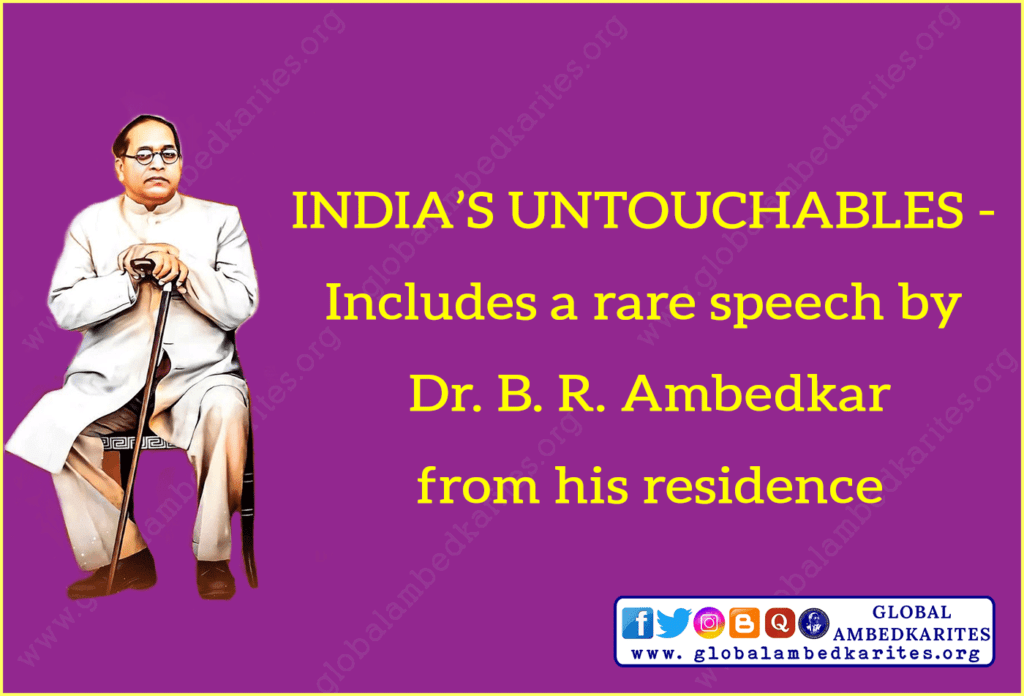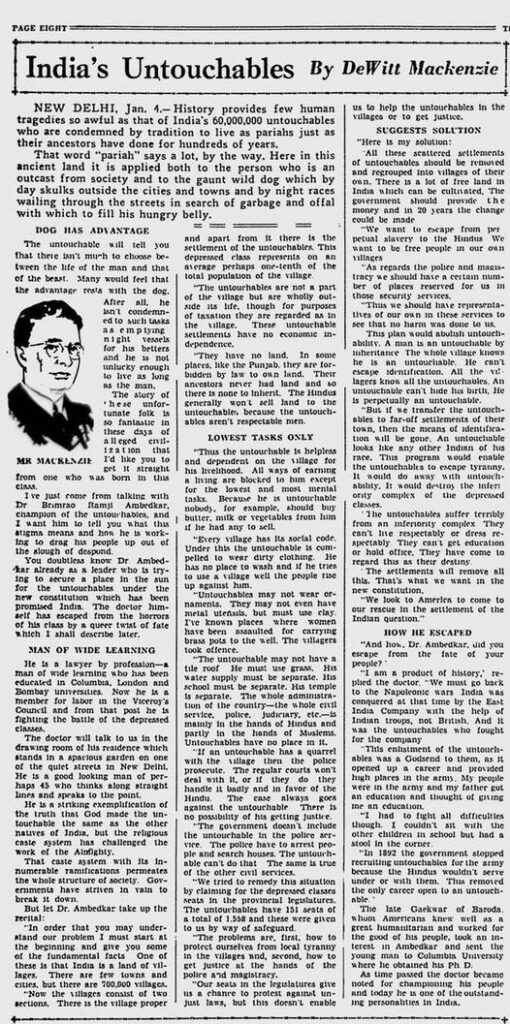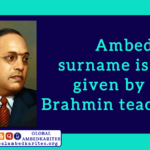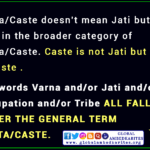
Today, 4th January 1943 in Ambedkarite History, an article by DeWitt Mackenzie appeared in ‘The Windsor Daily Star’ which includes Babasaheb’s speech from his residence in Delhi giving practical solutions to the problems of the Untouchables.
THIS IS A RARE PIECE which includes a speech by Babasaheb Dr. Ambedkar given at his residence in 1943 – Reproduced here with a few minor typographical errors edited.
=======================
NEW DELHI, Jan. 4.- History provides few human tragedies so awful as that of India’s 60,000,000 untouchables who are condemned by tradition to live as pariahs just as their ancestors have done for hundreds of years.
That word “pariah” says a lot, by the way. Here in this ancient land it is applied both to the person who is an outcast from society and to the gaunt wild dog which by day skulks outside the cities and towns and by night races wailing through the streets in search of garbage and offal with which to fill his hungry belly.
DOG HAS ADVANTAGE
The untouchable will tell you that there isn’t much to choose be- tween the life of the man and that of the beast. Many would feel that the advantage rests with the dog. After all, he Isn’t condemn- ed to such tasks as emptying night vessels for his betters and he is not unlucky enough to live as long as the man. The story of these unfortunate folk is so fantastic in these days of alleged civilization that I’d like you to get it straight from one who was born in this class.
I’ve just come from talking with Dr Bhimrao Ramji Ambedkar, champion of the untouchables, and I want him to tell you what this stigma means and how he is working to drag his people up out of the slough of despond.
You doubtless know Dr Ambedkar already as a leader who is trying to secure a place in the sun for the untouchables under the new constitution which has been promised to India. The doctor himself has escaped from the horrors of his class by a queer twist of fate which I shall describe later.
MAN OF WIDE LEARNING
He is a lawyer by profession-a man of wide learning who has been educated in Columbia, London and Bombay universities. Now he is a member for labor in the Viceroy’s Council and from that post he is fighting the battle of the depressed classes.
The doctor will talk to us in the drawing room of his residence which stands in a spacious garden on one of the quiet streets in New Delhi. He is a good looking man of perhaps 45 who thinks along straight lines and speaks to the point.
He is a striking exemplification of the truth that God made the untouchable the same as the other natives of India, but the religious caste system has challenged the work of the Almighty.
That caste system with its in- numerable ramifications permeates the whole structure of society. Governments have striven in vain to break it down.
But let Dr. Ambedkar take up the recital:
“In order that you may understand our problem I must start at the beginning and give you some of the fundamental facts. One of these is that India is a land of villages. There are few towns and cities, but there are 700,000 villages
“Now the villages consist of two sections. There is the village proper and apart from it there is the settlement of the untouchables. This depressed class represents on an average perhaps one-tenth of the total population of the village.”
“The untouchables are not a part of the village but are wholly out- side its life, though for purposes of taxation they are regarded as in the village. These untouchable settlements have no economic independence.
“They have no land. In some places, like the Punjab, they are forbidden by law to own land. Their ancestors never had land and so there is none to Inherit. The Hindus generally won’t sell land to the untouchable, because the untouchables aren’t respectable men.
LOWEST TASKS ONLY
Thus the untouchable is helpless and dependent on the village for his livelihood. All ways of earning a living are blocked to him except for the lowest and most menial tasks. Because he is untouchable nobody, for example, should buy butter, milk or vegetables from him if he had any to sell.
“Every village has its social code. Under this the untouchable is cum- pelled to wear dirty clothing. He has no place to wash and if he tries to use a village well the people rise up against him.
“Untouchables may not wear ornaments. They may not even have metal utensils, but must use clay. I’ve known places where women have been assaulted for carrying brass pots to the well. The villagers took offence.
“The untouchable may not have a tile roof. He must use grass. His water supply must be separate. His school must be separate. His temple is separate. The whole administra- tion of the country-the whole civil service, police, judiciary, etc – is mainly in the hands of Hindus and partly in the hands of Muslems. Untouchables have no place in it.
“If an untouchable has a quarrel with the village then the police (won’t) prosecute. The regular courts won’t deal with it, or if they do they handle it badly and in favor of the Hindu. The case always goes against the untouchable There is no possibility of his getting justice.
“The government doesn’t include the untouchable in the police service. The police have to arrest people and search houses. The untouchable can’t do that. The same is true of the other civil services.
“We tried to remedy this situation by claiming for the depressed classes seats in the provincial legislatures. The untouchables have 151 seats of a total of 1,558 and these were given to us by way of safeguard.
“The problems are, first, how to protect ourselves from local tyranny in the villages and, second, how to get justice at the hands of the police and magistracy.
“Our seats in the legislatures give us a chance to protest against unjust laws, but this doesn’t enable us to help the untouchables in the villages or to get justice.
SUGGESTS SOLUTION
“Here is my solution:
All these scattered settlements of untouchables should be removed and regrouped into villages of their own. There is a lot of free land in India which can be cultivated. The government should provide the money and in 20 years the change could be made.
“We want to escape from perpetual slavery to the Hindus We want to be free people in our own villages “. As regards the police and magistracy we should have a certain number of places reserved for us in those security services.
Thus we should have representatives of our own in these services to see that no harm was done to us. This plan would abolish untouchability. A man is an untouchable by inheritance The whole village knows he is an untouchable. He can’t escape identification. All the villagers know all the untouchables. An untouchable can’t hide his birth. He is perpetually an untouchable.
“But if we transfer the untouchables to far-off settlements of their town, then the means of identification will be gone. An untouchable looks like any other Indian of his race. This program would enable the untouchables to escape tyranny. It would do away with untouch- ability. It would destroy the inferiority complex of the depressed classes.
“The untouchables suffer terribly from an inferiority complex. They can’t live respectably or dress respectably. They can’t get education or hold office. They have come to regard this as their destiny.
The settlements will remove all this. That’s what we want in the new constitution,
“We look to the America to come to our rescue in the settlement of the Indian question.”
HOW HE ESCAPED
“And how, Dr. Ambedkar, did you escape from the fate of your people?
“I am a product of history, replied the doctor. “We must go back to the Napoleonic wars. India was conquered at that time by the East India Company with the help of Indian troops, not British. And It was the untouchables who fought for the company
“This enlistment of the untouchables was a Godsend to them, as it opened up a career and provided high places in the army. My people were in the army and my father got an education and thought of giving me an education.
“I had to fight all difficulties though. I couldn’t sit with the other children in school but had a stool in the corner.
In 1892 the government stopped recruiting untouchables for the army because the Hindus wouldn’t serve under or with them. This removed the only career open to an untouchable
The late Gaekwar of Baroda, whom Americans knew well as a great humanitarian and worked for the good of his people, took an interest in Ambedkar and sent the young man to Columbia University where he obtained his Ph D.
As time passed the doctor became noted for championing his people and today he is one of the outstand- ing personalities in India.
The Windsor Daily Star-India’s Untouchables





